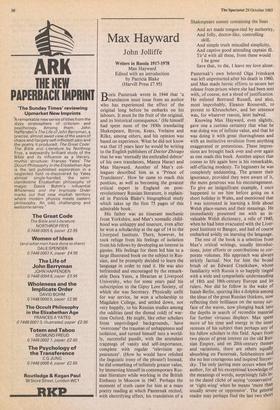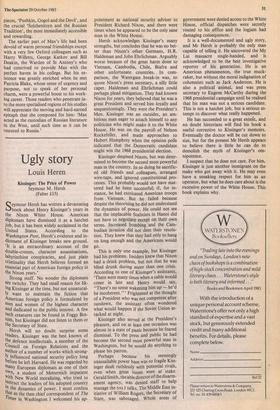Max Hayward
John Jolliffe
Writers in Russia 1917-1978 Max Hayward Edited with an introduction by Patricia Blake (Harvill Press £7.95)
Doris Pasternak wrote in 1944 that 'a 1J/translation must issue from an author who has experienced the effect of the original long before he embarks on his labours. It must be the fruit of the original, and its historical consequence.' (He himself had spent most of the 1930s translating Shakespeare, Byron, Keats, Verlaine and Rilke, among others, and his opinion was based on experience. What he did not know was that 15 years later he would be writing to the English publishers of Doctor Zhivago that he was 'eternally the enthralled debtor' of his own translators, Manya Harari and Max Hayward. Another of Max's col- leagues described him as a 'Prince of Translators'. How he came to reach this position, as well as becoming the greatest critical expert in England on post- revolutionary Russian literature, is explain- ed in Patricia Blake's biographical study which takes up the first 75 pages of this admirable book.
His father was an itinerant mechanic from Yorkshire, and Max's nomadic child- hood was unhappy and insecure, even after he won a scholarship at the age of 14 to the Liverpool Institute. There, however, he took refuge from his feelings of isolation from his fellows by developing an interest in gipsies. His feelings for them led him to a large illustrated book on the subject in Rus- sian, and he promptly decided to learn the language in order to read it. He was also befriended and encouraged by the remark- able Dora Yates, a librarian at Liverpool University, who for some years paid his subscription to the Gipsy Lore Society, of which she was Secretary. Physically unfit for war service, he won a scholarship to Magdalen College, and settled down, not very happily, to his Russian studies among the oddities (and the dismal cold) of war- time Oxford. He might, like other scholars from unprivileged backgrounds, have 'overcome' the traumas of unhappiness and isolation, and turned himself into a world- ly, successful pundit, with the attendant trappings of vanity and self-importance, complete with regular 'television ap- pearances'. (How he would have relished the linguistic irony of the phrase!) Instead, he did something of infinitely greater value, by immersing himself in contemporary Rus- sian literature while working in the British Embassy in Moscow in 1947. Perhaps the moment of truth came for him at a mass poetry reading at which Pasternak recited, with electrifying effect, his translation of a Shakespeare sonnet containing the lines And art made tongue-tied by authority, And folly, doctor-like, controlling skill, And simple truth miscalled simplicity, And captive good attending captain ill. Tir'd with all these, from these would I be gone
Save that, to die, I leave my love alone.
Pasternak's own beloved Olga Ivinskaya was left unprotected after his death in 1960, and Max made heroic efforts to secure her release from prison where she had been sent with, of course, not a shred of justification. He enlisted Bertrand Russell, and also, most improbably, Eleanor Roosevelt, to protest to Khruschchey, and her sentence was, for whatever reason, later halved.
Knowing Max Hayward, even slightly, gave one a curious certainty that what he was doing was of infinite value, and that he was doing it with great thoroughness and with an instinctive revulsion from anything exaggerated or pretentious. These impres- sions are brought back over and over again as one reads this book. Another aspect that comes to life again here is his remarkable, self-effacing modesty. To beginners he was completely undaunting. The greater their ignorance, provided they were aware of it, the more generous was his encouragement. To give an insignificant example, I once happened to see him before going on a short holiday in Wales, and mentioned that I was interested in learning a little about Welsh place-names and their meanings. He immediately presented me with an in- valuable Welsh dictionary, a relic of 1940, when he had been evacuated with the Liver- pool Institute to Bangor, and had of course embarked avidly on learning the language.
The rest of the book is a selection from Max's critical writings, usually introduc- tions, joint efforts or contributions to cor- porate volumes. His approach was always strictly factual. Not for him the broad brush of an Edward Crankshaw, whose familiarity with Russia is so happily tinged with a wide and sympathetic understanding of 18th and 19th-century Europe and its rulers. Nor did he follow in the wake of Isaiah Berlin, sporting like a dolphin among the ideas of the great Russian thinkers, now reflecting their brilliance on the sunny sur- face of the waves, now plunging back into the depths in search of recondite material for further virtuoso displays. Max spent more of his time and energy in the inner recesses of his subject than perhaps any of his fellow scholars in this field. Apart from two pieces of great interest on the old Rus- sian Empire, and on 20th-century themes and variations, there are others equallY absorbing on Pasternak, Solzhenitsyn and the no less courageous and inspired Sinyav- sky. The only jarring note occurs when the author, for all his exceptional knowledge of the meanings of words, surprisingly falls in- to the dated cliche of saying 'conservative' or 'right-wing' when he means 'more than usually severe or oppressive'. The general reader may perhaps find the last two short
pieces, 'Pushkin, Gogol and the Devil', and the crucial 'Solzhenitsyn and the Russian Tradition', the most immediately accessible and rewarding.
The earlier part of Max's life had been devoid of warm personal friendships except with a very few Oxford colleagues such as Harry Willetts, George Katkov and Bill Deakin, the Warden of St Antony's who had contrived to provide Max with the perfect haven in his college. But his ex- istence was greatly enriched when he met Patricia Blake, whose sense of urgency and purpose, not to speak of her personal charm, were a powerful boost to his work- ing career. Those readers who penetrate in- to the more specialised regions of his studies will appreciate the moving and hard-earned epitaph that she composed for him: 'Max acted as the custodian of Russian literature in the West, until such time as it can be restored to Russia.'















































 Previous page
Previous page